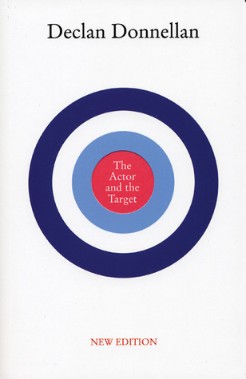Acting is a mystery, and so is theatre. We assemble in a space and divide into two parts, one of which enacts stories for the remainder. We know of no society where these rituals never happen, and in many cultures these events are at the very centre of that society. There is a persistent need to witness acted-out representations, from television soap opera to Greek Tragedy.
A theatre is not only a literal space, but also a place where we dream together; not merely a building, but a space that is both imaginative and collective. Theatre provides a safe frame within which we can explore dangerous extremities in the comfort of fantasy and the reassurance of a group. If every auditorium were razed to the ground, theatre would still survive, because the hunger in each of us to act, and to be acted to, is inbred. We direct, perform and witness performances to communicate with ourselves as we sleep; theatre cannot die before the last dream has been dreamt.
'I am therefore I act’
We live by acting roles, be it father, mother, teacher or friend. We construct our sense of self by playing roles we see our parents play and develop our identities further by copying characters we see played by elder brothers, sisters, friends, rivals, teachers, enemies or heroes.
A baby is born not only with an expectation of ‘mother’ and ‘language’, but also with an anticipation of ‘acting’; the child is genetically prepared to copy behaviours that it will witness. The first theatrical performance a baby enjoys is when its mother acts out appearing and disappearing behind a pillow. ‘Now you see me; now you don’t!’ The baby gurgles away, learning that this most tragic event, separation from the mother, might be prepared for and dealt with comically, theatrically. The baby learns to laugh at a potentially appalling separation, because this time, it isn’t real. Mummy reappears and laughs — this time, at least. After a while the child will learn to be the performer, with the parent as audience, playing peek-a-boo behind the sofa; and eventually the game will evolve into the more sophisticated ‘hide and seek’, with multiple performers, and even a winner. Eating, walking, talking, all are developed by copying and applause. Whatever human instinct is latent, it only reaches virtuosity after acute observation, repetition and performance. You cannot teach children how to act out situations, precisely because they already do — they wouldn’t be human if they didn’t. ‘I copy my father eating his toast. I copy my mother reading the paper.’ Acting is a reflex, a mechanism for development and survival. This primitive instinct to act is the basis of what is meant by ‘acting’ in this book. It isn’t ‘second nature’, it is ‘first nature’ and so cannot be taught like chemistry or scuba diving. So, if acting in itself cannot be taught, how can we develop or train our ability to act?
Our quality of acting develops and trains itself when we simply pay it attention. All we can be ‘taught’ about acting are double negatives. We can be taught how not to block our natural instinct to act, just as we can be taught how not to block our natural instinct to breathe. Of course we can learn a multitude of stylised developments of our natural reflexes. The Noh actor in Japan may take decades to perfect a single gesture, as the ballerina will sweat years developing feats of muscular control. But all the Noh master’s virtuosity will go for little if his ornate technique reveals nothing but ornate technique.
